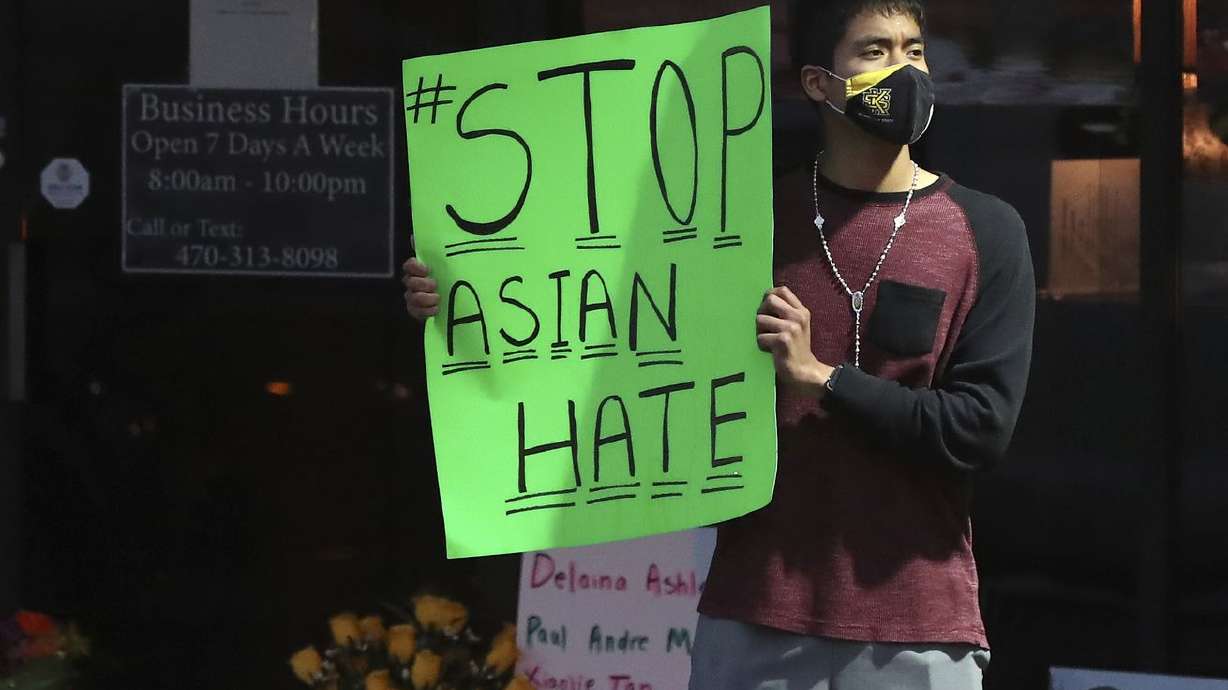Estimated read time: 4-5 minutes
This archived news story is available only for your personal, non-commercial use. Information in the story may be outdated or superseded by additional information. Reading or replaying the story in its archived form does not constitute a republication of the story.
SALT LAKE CITY — Asian Americans, like all Americans, have suffered the economic and health consequences of COVID-19, while at the same time fighting another virus the past year.
"Unfortunately, Asian Americans have been fighting this second virus, this virus of racism," said John Yang, president and executive director of Asian Americans Advancing Justice. "We have long struggled for visibility and equity and now our communities are faced with additional physical and mental harm that is arising out of this COVID-19 pandemic."
Yang was among Asian American members of Congress, scholars and advocates, including actor Daniel Dae Kim, who testified Thursday about the rise in discrimination against Asian Americans before the House Judiciary Subcommittee on the Constitution, Civil Rights and Civil Liberties.
The hearing came on the heels of a shooting spree at three Atlanta-area spas that left eight people dead, including six Asian American women.
Asian American lawmakers noted that there have been 3,800 reported incidents of anti-Asian hate crimes the past year, nearly 70% of which targeted Asian American women.
"Our community is bleeding. We are in pain and for the last year we have been screaming out for help," Rep. Grace Meng, D-N.Y., said. "Anti-Asian rhetoric like 'China virus,' 'Kung flu,' misinformation, racism have left Asian Americans traumatized and fearful for their lives."
Meng became emotional responding to comments Rep. Chip Roy, R-Texas, made about China.
"Your president and your party and your colleagues can talk about issues with any other country that you want, but you don't have to do it by putting a bull's-eye on the back of Asian Americans across this country, on our grandparents, on our kids," Meng said, her voice rising.
Related:
"This hearing was to address the hurt and pain of our community and to find solutions, and we will not let you take our voice away from us."
Earlier in the hearing, Roy said his "concern about this hearing is that it seems to want to venture into the policing of rhetoric in a free society, free speech, and away from the rule of law and taking out bad guys."
His opening remarks centered on the Chinese government, including speaking out against the country's treatment of the Uyghur people and its hiding of the coronavirus outbreak.
"I think the Chinese Communist Party running the country of China, I think they're the bad guys," he said.
Roy said he's not ashamed of saying he opposes "Chicoms" or the Chinese Communist Party.
"And when we say things like that, and we're talking about that, we shouldn't be worried about having a committee of members of Congress policing our rhetoric because some evildoers go engage in some evil activity as occurred in Atlanta, Georgia," he said.
Rep. Burgess Owens, R-Utah, a committee member, focused his comments and questions on discrimination at colleges and universities.
"In addition to the violence, we're also seeing institutional discrimination against Asian Americans in universities. Overall, the Asian community has been very successful academically but has also been discriminated against because it's a culture committed to meritocracy," he said.

The Department of Justice sued Yale University for allegedly discriminating against Asian American and white applicants last October but dropped the controversial lawsuit in February.
Last November, a federal appeals court rejected a similar lawsuit against Harvard University, finding that the school did not intentionally discriminate against Asian American applicants in its admissions process.
Owens didn't mention either university or any other school by name, but said "I understand exactly what institutional racism looks like and using someone's race as a factor against them in admission to college is totally un-American. Our colleges must end that now. ... Our government cannot condone or take part in this type of racism."
The freshman lawmaker asked the panel of experts if there is a way for colleges and universities to consider diversity without considering race in the application process.
Wencong Fa, an attorney with the Pacific Legal Foundation, said he believes there is a way to do that but it's a mistake to limit it to racial diversity.
"I think a lot of universities aren't very diverse in terms of different ideologies, different viewpoints," he said. "I think we should be doing more to ensure that students on college campuses are hearing views from all sides."
Fa also said reducing or eliminating admission preferences for athletes, legacies, big donors and children of faculty would lead to an increase in even racial diversity without using racial preferences.
Some of the Democratic lawmakers on the committee attributed the surge in attacks on Asian Americans to the words former President Donald Trump and other Republicans used in referring to COVID-19.
Rep. Judy Chu, D-Calif., said anti-Asian hate crimes and incidents were "stoked by the words of former President Donald Trump who sought to shift blame and anger away from his own flawed response to the pandemic."
Chu said Trump used "racial slurs" in referring to the coronavirus despite the fact the Centers for Disease Control and Prevention and the World Health Organization warned against associating the virus with a specific ethnicity, country our geographic region because of the stigma it causes.
Even though Trump is no longer president, Chu said she believes the most recent anti-Asian attacks are aftermath of the past year of "ugly" comments.











